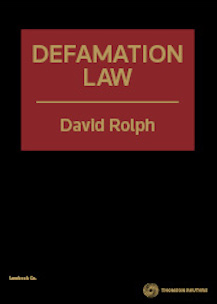Salaciousness disguised as gravitas
 Theodora •
Theodora •  Friday, December 4, 2015
Friday, December 4, 2015 Book launch news ... Defamatorium ... Launch by Justinian's editor of David Rolph's steamy, yet scholarly, work on defamation law ... Cocktails and nourishment turned on by Gilbert + Tobin ... Historic occasion on which a book launch was not performed by Michael Kirby
 Peter Leonard (Gilbert + Tobin), the editor-at-large, M. Kirby and Dr David Rolph, at the launch of "Defamation Law"
Peter Leonard (Gilbert + Tobin), the editor-at-large, M. Kirby and Dr David Rolph, at the launch of "Defamation Law"
I agreed to launch David Rolph's book Defamation Law, on condition that I didn't have to read it.
This is in keeping with the army of book reviewers who invariably don't read the books they are reviewing.
Why should this occasion be any different? After all, as is Michael Kirby's custom, the first thing I did was to check the index, only to be disappointed.
So, I thought it would be a fitting moment to give my views about defamation and leave the book to one side.
After all, the cover doesn't exactly lure the reader to explore too deeply. Yet, after some furtive delving I discovered something.
David Rolph has produced a steamy, racy, bodice ripper of a book hiding inside a serious, scholarly, detailed, authoritative legal text.
It's as though English stockbrokers in the early 1920s on the Sevenoaks train to London were reading Lady Chatterley's Lover in a plain brown cover.
Here we have the full unexpurgated Ettinghausen v APC, Rivkin v Amalgamated TV, Advanced Hair Studios v TVW Enterprises, ABC v Hanson, Abbott v Random House.
Salaciousness disguised as gravitas.
It's the entire cast of characters that have made David Rolph what he is today.
What we also find is the brilliant way Dr Rolph has turned himself into a one man celebrity defamation echo vortex.
Various of his students at the law school have graduated into the refined campus of journalism where their first port of call in reporting court proceedings involving media defendants is to ring Dr Rolph for a comment.
Hence you see reported by Michaela Whitborne in The Sydney Morning Herald perspectives that you're unlikely to get elsewhere:
"Associate Professor Rolph said this is a complex case, and the outcome is unpredictable ..."
In turn this has made David Rolph a household name. Tradies on building sites, fitters and turners, sheet metal workers are often heard to say over their quail-in-aspic sandwiches at lunchtime, "Did you see what Doc Rolph told the Telegraph on qualified privilege"?
As they say on Radio National, at least he has started to unpack a conversation about defamation and the fetters on the media.
One thing he has brought to the fore is the declining quality of defamation plaintiffs. Whereas previously the caper was confined to professional people, serious public figures and captains of industry, now the ranks of plaintiffs are clogged with jail birds, strip club operators, notoriously corrupt politicians, bikies and Muslim protesters.
The whole concept of reputation has changed. Now everyone has one, which makes life much harder for the free press and the freedom to get stuck into despicable people.
In the early days of my organ Justinian, I used to go down as see Hugh Keller at Dawson Waldron, until ultimately he said, "I can't advise you. I can't give you answers to whether it's safe to publish or not. Maybe. Maybe not."
If only, in those days we'd had David Rolph's scholarly book by our side to bring clarity to confusion.
If anything his book is a pointer to the shocking shortcomings of our defamation law, a law stuck in the age of the golf club notice board that does not reflect the reality of what is happening with digital publishing.
Our courts and legislators are well behind the curve in their response to information technology.
The courts even think that search engines can be treated as publishers of defamatory statements and this applies even where the operator of a search engine is not on notice.
More than anything the internet with its army of bloggers requires the response of a single publication rule, a serious harm test, someone to work out a contextual truth defence, a responsible journalism defence and an end to the unworkability of the High Court's efforts in Lange.
These are much more pressing issues for journalists, publishers and their legal advisors than amending the Racial Discriminate Act or other misplaced culture warrior ideas of improving free speech.
The 2005 reforms to defamation unified, nationally, a lot of old and quite poor law. It's unlikely that an attorney general, who's idea of free speech is to spy on citizens and send journalists to jail if they stumble upon something deemed to be a "special intelligence operation", will lead the charge.
 But a campaign is needed to end defamation as a mugs game. David Weisbrot and the Press Council have signalled that they are interested in giving the reform agenda a push and this may be the moment for the media to take it seriously.
But a campaign is needed to end defamation as a mugs game. David Weisbrot and the Press Council have signalled that they are interested in giving the reform agenda a push and this may be the moment for the media to take it seriously.
I want to congratulate David on another important and splendid book, his fourth on media law.
And I'm more than happy to tip some of Gilbert + Tobin's sparkling refreshment over the cover and sent it down the slipway of retail triumph.
 Defamation
Defamation 








Reader Comments